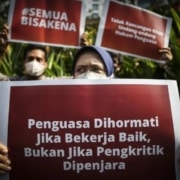
Photo by CIFOR from Flickr.
More than twenty years ago, Indonesia launched a determined crusade against corruption, collusion, and nepotism. However, the zealous spirit of Indonesia’s political reformation seems to have dissipated along the way.
Experts and observers now suggest the fight against corruption has lost its prime spot on the national agenda – mainly due to the rise of the oligarchs, who see it as a threat.
How do we make sense of the current situation? I think the answer partly lies in decolonising the anti-corruption discourse in Indonesia.
Colonial conceptions of corruption
Corruption discourse in Indonesia conforms to a dominant narrative. This tends to emphasise moral judgment, and interprets corruption as a product of rational choices. It seeks to establish universal connections, notably between corruption and economic development or democracy, and is often referred to as the positivist perspective.
Because of this, research often portrays corruption as an intrinsic feature of non-Western cultures or nations. In doing so, it overlooks historical trajectories, socio-economic contexts and power imbalances among nations, societies and individuals.
For example, the well-known Corruption Perception Index (CPI) from Transparency International relies heavily on the views of business leaders and analysts from Western countries. This Eurocentric viewpoint, influenced by entities like the World Economic Forum, categorises wealthier nations, like Australia, as ‘clean’ and poorer nations, like Indonesia, as ‘corrupt.’
William de Maria argues the CPI represents a “Western business consensus about the meaning of corruption, masquerading as a world-applicable definition.” He argues seeing corruption as a “trans-cultural disease” does little to address corruption in highly varied local social and economic conditions. This approach orientalises non-Western countries, benchmarking them against neoliberal capitalist democracies, ultimately finding them inadequate.
Grounding corruption discourse in local experiences
In previous research, I have dismantled familiar conceptions about corruption in Indonesia, questioning whether Western perspectives are universally valid. My work has shown how the corruption in Indonesia is intertwined with other concepts – especially democracy. In my view, the simplistic notion that promoting democracy, in and of itself, will cure corruption needs to be challenged and reframed. That is because this narrow interpretation of corruption is itself an effect of a power imbalance that overlooks the concerns and experiences of local communities.
Under the current anti-corrption paradigm, anti-corruption efforts have evolved into an industry, attracting more attention and channelling resources towards new mechanistic tools, like performance indicators, and cultivating a few good apples while keeping the larger system of power and resource distribution intact. These tools are often detached from everyday practices, often leading to superficial or paradoxical outcomes, like leaders receiving anti-corruption awards one day and subsequently being implicated in corruption scandals the next.
Another major problem is that, due to the dominance of moralist, rationalist, and positivist approaches in anti-corruption research, the influence of corporations in the corruption narrative remain underexplored because this dominant paradigm downplays the significance of other contextual factors like widening socio-economic inequality and the unequal power relations between the people, government and business interests in Indonesia.
The prevalence of neoliberal values in the dominant anti-corruption discourse narrows discussions of transparency and accountability to compliance – and mechanistic solutions like reporting and audits – rather than holding the powerful accountable to community stakeholders for their social and environmental performance.
This underscores the need to link anti-corruption discourse with broader discussions on structural power and resource inequality. But currently, the anti-corruption industry often overlooks private sector complicity in corruption and unexplained enrichment of businesspeople – including the oligarchs.
For example, farmers in remote areas of Kalimantan have suffered loss of lands and livelihoods to palm oil corporations that are successfully “backdooring the law” through sophisticated lobbying and nepotistic licensing processes. Perdana Roswaldy’s research demonstrates farmers are often left asking why these shadowy practices of wealth accumulation do not also constitute corruption – but their concerns are usually overlooked.
Broadening our understanding of corruption
Examining alternative discourses reveals how the corruption discourse has been narrowed to focus on “state losses”, which is even reflected in the statutory definition of corruption under Indonesian law. Economic anthropologist Jason Hickel’s research, for example, demonstrates that corporate exploitation through profit-shifting and the exploitative lending practices of advanced nations have far-reaching consequences.
The economic costs of these practices far outweigh the relatively modest state losses typically targeted by the anti-corruption industry. This highlights the importance of generating anti-corruption discourse that critically evaluates private sector practices.
By questioning these practices, Hickel proposes framing “corruption” as a consequence of power imbalances on a global scale, extending beyond localised issues like bribery in countries like Indonesia. The flow of wealth, resources and energy from the Global South to the North is a key driver of inequality and public sector ineffectiveness in the South, where government budgets have been hollowed out. The deficiency of public funding, due to this global exploitation, ultimately fuels the practices often labelled as corruption in various parts of the world.
Where to from here?
Anti-corruption education programs in Indonesia – and the dominant moralist, rationalist, and positivist approaches – often falter in their ability to address institutionalised power and resource inequalities.
But embracing decolonial perspectives unravels the interconnectedness of corruption, power imbalances, and structural inequalities between nations, societies, and individuals.
Critically examining the role of dominant discourses in today’s anti-corruption landscape is an imperative. Indonesia’s oligarchs and multinational corporations are allowed to participate in a global economic system that has normalised and enabled resource extraction, privatisation, profit shifting and restricted government services – leaving little behind to incentivise a professional and service-oriented civil service.
When we adopt this broader view of corruption, we see it is no longer confined to Indonesia and the Global South. Only a holistic approach can pave the way for change, linking anti-corruption efforts to global justice and equity dialogues.











